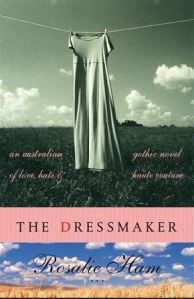 It’s a few weeks since I finished reading The Dressmaker by Rosalie Ham but it is still on my mind. It’s a popular kind of book with me – a straightforward tale of life in a small Australian rural town. The author has let her imagination run wild to include many variations of human behavior in her range of characters.
It’s a few weeks since I finished reading The Dressmaker by Rosalie Ham but it is still on my mind. It’s a popular kind of book with me – a straightforward tale of life in a small Australian rural town. The author has let her imagination run wild to include many variations of human behavior in her range of characters.
Forced to leave town as a teenager Myrtle Dunnage, known as Tilly, returns to care for her mother who lives on a rise on the outskirts of town. The teenager has matured and become a dressmaker of couture standard, quite different to the girl who went away. Gradually some of the town come to use her skills as a dressmaker but do not welcome her back into the life of the town.
I smiled and I laughed at a lovely sense of oneupmanship. I wept when there was a death as I moved through the book.
But then a sense of unease started to sneak into my feelings. This book is so deceptive. It reels you in with its sense of humour and beautiful clothes while all the time a tragedy of classic proportions is slowly taking shape.
My friends laugh and smile when asked how they enjoyed the book. They talk of the clothes which Tilly makes. But time has leeched the humour and the clothes from my memory of the book and all I am left with is this feeling of doom.
It is a small town. Everyone knows everyone. And they seem unable to face the truth about a tragic accident years earlier. Tilly was blamed whereas the town needs to take one step further back and look at the bully who was the real cause of the accident. They seemed unable to do that. So much easier to blame the misfit than the son of a “respectable” family.
Tilly cares for her aging mother, she makes beautiful clothes for all who ask her, and she proffers well-founded advice which is rejected. The tension is building for the townspeople to be humiliated and Tilly’s final act before leaving town has unexpected far-reaching tragic effects.
Am I reading more into it than the author intended ? Perhaps it is the same for everyone – it is what is inside us that makes us interpret the book in different ways. But I judge a book by what remains with me after the details have leeched away and in this case it was the way the author lulled me into a warm and comfortable feeling, wallowing in the nostalgia of small town life, while all the time the destruction of a town is bubbling away underneath
But then that’s just my opinion. And what do I know. But then I do know that I will be re-reading this book and that I look forward to seeing how the upcoming movie with Kate Winslett will interpret the story and how the reviewers will rave about the clothes !

